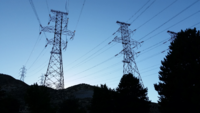
Photo from wikipedia
Abstract At present, the traditional islanded microgrid is changing to a cyber-physical system. And the data in its cyber layer is often used to solve practical problems in the physical… Click to show full abstract
Abstract At present, the traditional islanded microgrid is changing to a cyber-physical system. And the data in its cyber layer is often used to solve practical problems in the physical layer through sensors and communicators. But the use of communication data also brings a lot of problems. Among them, the upload interruption problem (i.e., communicator or sensor failure) will make a heavy impact on the system. To improve the voltage and frequency stability of microgrid through secondary control considering data uploading interruption, an improved growing and pruning-radial basis function neural network-based secondary control strategy is designed in this study. The main designs can be summarized as below: (1) When the communicator cannot receive data, a prediction compensation part is designed directly in the corresponding communicator, i.e., the predicted data is used to complete the follow-up works; (2) When the sensor cannot send data, a nonlinear cyber-physical vulnerability assessment part and a neighbor transmission part are designed. In this way, a neighbor sensor is selected to send the interrupted data for the follow-up control process; (3) Based on these designs above, a novel secondary control is designed for microgrid. Finally, the simulation results show the effectiveness of the proposed strategy.
Journal Title: Neurocomputing
Year Published: 2020
Link to full text (if available)
Share on Social Media: Sign Up to like & get
recommendations!